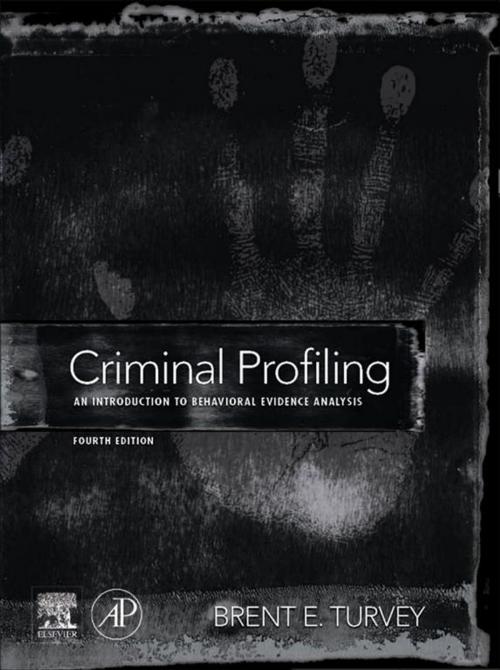Criminal Profiling
An Introduction to Behavioral Evidence Analysis
Nonfiction, Reference & Language, Law, Forensic Science, Science & Nature, Science, Biological Sciences, Social & Cultural Studies, Social Science| Author: | ISBN: | 9780123852441 | |
| Publisher: | Elsevier Science | Publication: | March 9, 2011 |
| Imprint: | Academic Press | Language: | English |
| Author: | |
| ISBN: | 9780123852441 |
| Publisher: | Elsevier Science |
| Publication: | March 9, 2011 |
| Imprint: | Academic Press |
| Language: | English |
Now in its fourth edition, Criminal Profiling - winner of a 2013 Texty Award from the Text and Academic Authors Association - is an established resource centered on the deductive profiling method developed by the author. With 35% new content, this edition contains cases in each chapter, along with the latest advances in evidence-based profiling. Additional information has been added covering topics such as mass homicide, as well as the timely inclusion of a chapter on terrorist profiling and interviewing.
Deductive profiling is different from other forms of profiling in that it does not involve averaged, statistical profiles. Instead it focuses on criminal profiling as an investigative process, solving real crime through an honest understanding of the nature and behavior of criminals. It approaches each criminal incident as its own universe of behaviors and relationships. Throughout the text, the author illustrates the most crucial tenet that any good criminal profiler should adhere to: the enthusiastic desire to investigate and examine the facts.
Criminal Profiling, Fourth Edition, is an ideal companion for students and professionals alike, including investigators, forensic scientists, criminologists, mental health professionals, and attorneys. Readers will use it as a comprehensive reference text, a handbook for evaluating physical evidence, a tool to bring new perspectives to cold cases, and as an aid in preparing for criminal trials.
- Best-selling author Brent Turvey defines the deductive profiling method, which focuses on examining the nature and behavior of criminals in order to solve crimes
- Contributing authors represent law enforcement, academic, mental health, and forensic science communities for a balanced perspective
- Completely revised with 35% new material including updates on the latest advances in evidence-based profiling
New to this edition
- New cases in every chapter
- New chapters in logic and reasoning
- New chapter reviewing non-evidence based profiling methods
- New chapter on mass homicide
- New chapter on terrorist profiling and interviewing
Now in its fourth edition, Criminal Profiling - winner of a 2013 Texty Award from the Text and Academic Authors Association - is an established resource centered on the deductive profiling method developed by the author. With 35% new content, this edition contains cases in each chapter, along with the latest advances in evidence-based profiling. Additional information has been added covering topics such as mass homicide, as well as the timely inclusion of a chapter on terrorist profiling and interviewing.
Deductive profiling is different from other forms of profiling in that it does not involve averaged, statistical profiles. Instead it focuses on criminal profiling as an investigative process, solving real crime through an honest understanding of the nature and behavior of criminals. It approaches each criminal incident as its own universe of behaviors and relationships. Throughout the text, the author illustrates the most crucial tenet that any good criminal profiler should adhere to: the enthusiastic desire to investigate and examine the facts.
Criminal Profiling, Fourth Edition, is an ideal companion for students and professionals alike, including investigators, forensic scientists, criminologists, mental health professionals, and attorneys. Readers will use it as a comprehensive reference text, a handbook for evaluating physical evidence, a tool to bring new perspectives to cold cases, and as an aid in preparing for criminal trials.
- Best-selling author Brent Turvey defines the deductive profiling method, which focuses on examining the nature and behavior of criminals in order to solve crimes
- Contributing authors represent law enforcement, academic, mental health, and forensic science communities for a balanced perspective
- Completely revised with 35% new material including updates on the latest advances in evidence-based profiling
New to this edition
- New cases in every chapter
- New chapters in logic and reasoning
- New chapter reviewing non-evidence based profiling methods
- New chapter on mass homicide
- New chapter on terrorist profiling and interviewing















